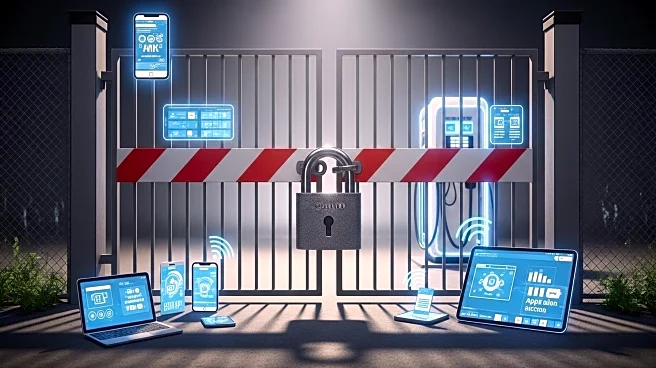What's Happening?
The adoption of electric vehicles (EVs) in the United States is being slowed by financial gatekeeping and the requirement of smartphone apps for accessing charging infrastructure. Financial gatekeeping refers to the barriers individuals face in accessing financial products and services, such as credit cards and fee-free checking accounts. This issue is compounded by the fact that many EV charging stations require a smartphone app and linked credit card for use. While 91% of Americans own a smartphone, many struggle with maintaining data plans or face issues when their phone is out of service or battery. Additionally, 4.2% of U.S. households are unbanked, and 14.2% are underbanked, lacking access to mainstream financial services. This situation creates significant barriers for lower-income individuals who may rely on public charging stations, which often require credit card and smartphone access.
Why It's Important?
The barriers posed by financial gatekeeping and app requirements have broader implications for the equitable adoption of EVs. Lower-income individuals, who are more likely to rely on public charging due to lack of home charging options, face significant challenges. This situation exacerbates transportation inequities, as those without access to necessary financial tools or technology are effectively excluded from the benefits of EV ownership. The issue also impacts tourism and rental fleets, where users may face difficulties accessing charging infrastructure due to unfamiliarity with required apps or payment methods. Addressing these barriers is crucial for ensuring that the transition to EVs is inclusive and accessible to all segments of society.
What's Next?
To address these challenges, there is a need for more utilitarian public charging systems that offer multiple payment options, including cash, and do not rely solely on smartphone apps. Models from public transit systems, which provide various payment methods and often include kiosks with attendants, could be adapted for EV charging. Additionally, regulatory measures and common standards could ensure that public charging becomes as accessible as traditional fuel stations. These steps are essential to make EV adoption feasible for all drivers, regardless of their financial or technological capabilities.
Beyond the Headlines
The issue of financial gatekeeping in EV adoption also raises questions about the long-term sustainability of the EV market. As EV batteries are expected to outlive the vehicles themselves, there may be a shift in the market dynamics, affecting the availability of affordable used EVs. This could further impact lower-income individuals who rely on purchasing older vehicles. Addressing these systemic issues is crucial for ensuring a just transition to electric mobility.









